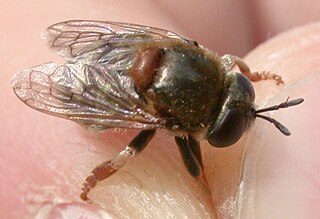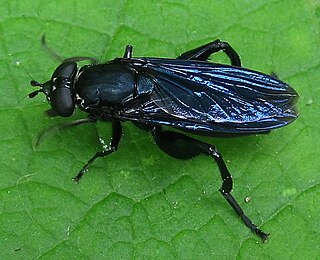
Hover flies, also called flower flies or syrphid flies, make up the insect family Syrphidae. As their common name suggests, they are often seen hovering or nectaring at flowers; the adults of many species feed mainly on nectar and pollen, while the larvae (maggots) eat a wide range of foods. In some species, the larvae are saprotrophs, eating decaying plant and animal matter in the soil or in ponds and streams. In other species, the larvae are insectivores and prey on aphids, thrips, and other plant-sucking insects.

The subfamily Microdontinae contains slightly more than 400 species of hoverflies and, while diverse, these species share several characteristics by which they differ from other syrphids. The Microdontinae are myrmecophiles, meaning they live in the nests of ants. Larval Microdontinae are scavengers or predators in ant nests, and, in contrast to other syrphid larvae, have no readily apparent body segmentation. Some species also do not exhibit the typical adult flower-visiting behaviour of other hoverflies, but instead remain near their larval host colonies.

Xylota is a Holarctic genus of hoverflies similar in structure to the related genera Chalcosyrphus and Brachypalpoides. As the larvae are saprophytic they're usually found in rotting wood. The adult flies are generally associated with woodland and woodland edges and can often be seen running over the upper sides of leaves. Unlike other syrphids the adults of many species rarely visit flowers preferring instead to gather pollen from leaf surfaces. There are over 100 described species of which 12 can be found in Europe. Seven species have been recorded in Britain. Identification of species has been difficult and identifiction by photographs is risky.

Chalcosyrphus is a genus of hoverflies in the subfamily Eristalinae. Many species exhibit some degree of mimicry of various sawflies and other hymenopterans and are often brightly coloured or metallic in hue. The adults are similar in structure and behavior to the related genus Xylota but differ in larval morphology. They can be found throughout Europe, Asia, and North America and seem to prefer damper, boggy habitats. The larvae are saproxylic feeders in rotten wood in these habitats.

Tropidia is a genus hoverflies, from the family Syrphidae, in the order Diptera.

The Milesiini is a large and diverse tribe of hoverflies. They mimic wasps or hornets.
Milesiina is a subtribe of syrphid flies in the family Syrphidae. There are at least 14 described species in Milesiina.
Chalcosyrphus shirakii is a species of syrphid fly in the family Syrphidae.
Milesia macularis is a species of hoverfly in the family Syrphidae.
Sterphus is a genus of hoverflies.
Sterphus nigrita is a species of Hoverfly in the family Syrphidae.
Temnostoma jozankeanum is a species of syrphid fly in the family Syrphidae.
Temnostoma taiwanum is a species of syrphid fly in the family Syrphidae.
Temnostoma nigrimanus is a species of syrphid fly in the family Syrphidae.
Temnostoma pallidum is a species of syrphid fly in the family Syrphidae.
Temnostoma pauperius is a species of syrphid fly in the family Syrphidae.
Xylota fo is a species of hoverfly in the family Syrphidae.
Xylota stylata is a species of hoverfly in the family Syrphidae.
Sphegina tricoloripes is a species of syrphid fly in the family Syrphidae.
Sphegina tristriata is a species of syrphid fly in the family Syrphidae.





